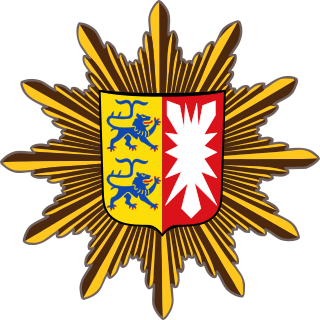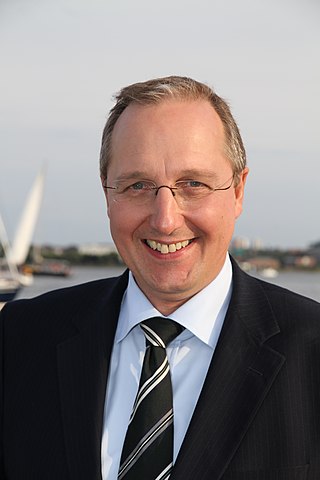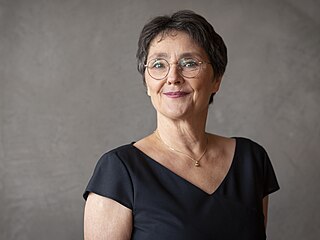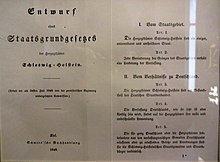
Eckernförde is a city located in the Kreis of Rendsburg-Eckernförde, Schleswig-Holstein, northern Germany. Situated on the coast of the Baltic Sea, approximately 30 km north-west of Kiel, it has a population of about 23,000. Eckernförde is a popular tourist destination.

The South Schleswig Voters' Association is a regionalist political party in Schleswig-Holstein in northern Germany. The party represents the Danish and Frisian minorities of the state.

Heide Simonis was a German author and politician of the Social Democratic Party (SPD). She was minister of finance in Schleswig-Holstein from 1988 until 1993, when she became minister-president of Schleswig-Holstein. She was the first woman to serve as head of a state government in German history and the only woman to do so in the 20th century, serving until 2005. As of September 2023, she is also the longest serving former female minister-president of a German state.

The 2005 Schleswig-Holstein state election was held on 20 February 2005 to elect the members of the Landtag of Schleswig-Holstein. The incumbent coalition government of the Social Democratic Party (SPD) and The Greens led by Minister-President Heide Simonis was defeated, bringing an end to 17 years of SPD governments in the state.

Peter Harry Carstensen is a German politician of the Christian Democratic Union (CDU). From 2005 to 2012 he was Minister President of the state of Schleswig-Holstein, serving as President of the Bundesrat in 2005/06.

Schleswig-Holstein Police is a state law-enforcement agency in Schleswig-Holstein, Germany. It is subordinated to the Schleswig-Holstein Ministry of the Interior, Municipal Affairs, Housing and Sports.

The Schleswig-Holstein Landtag is the state parliament of the German state of Schleswig-Holstein. It convenes in the state's capital Kiel and currently consists of 69 members of five parties. The current majority consists of coalition of the Christian Democratic Union and the Greens, supporting the cabinet of Minister President Daniel Günther.

The 2009 Schleswig-Holstein state election was held on 27 September 2009 to elect the members of the Landtag of Schleswig-Holstein. It was held on the same day as the 2009 federal election and the 2009 Brandenburg state election.

The 2012 Schleswig-Holstein state election was held on 6 May 2012 to elect the members of the Landtag of Schleswig-Holstein. The incumbent coalition government of the Christian Democratic Union and Free Democratic Party (FDP) was defeated. Though the CDU remained the largest party, the Social Democratic Party (SPD) negotiated a coalition with The Greens and the South Schleswig Voters' Association (SSW). This was dubbed the "Danish traffic light" or "Namibia coalition". SPD leader Torsten Albig was subsequently elected Minister-President by the Landtag.

Torsten Albig is a German politician from the Social Democratic Party of Germany. From 2012 until 2017 he served as the 13th Minister President of Schleswig-Holstein.

Henning Schwarz was a German politician of the Christian Democratic Union (CDU). He was interim Minister-President of Schleswig-Holstein during the Barschel affair.
The Minister-president is the head of state and government in thirteen of Germany's sixteen states.

Patrick Breyer is a German digital rights activist, jurist, Pirate Party Germany politician, and – since 2019 – Member of the European Parliament (MEP). From 2012 to 2017 he was a member of the state parliament of Schleswig-Holstein and from April 2016 until the end of the legislative period he was also the leader of the Pirate group in that assembly. Breyer is one of four European Pirate Party MEPs in the 2019–2024 term along with three Czech Pirate Party members, all of whom are members of the Greens / EFA parliamentary group.

Aminata Touré is a German politician of Alliance 90/The Greens, the German green party, who has been serving as Deputy Minister-President since 1 August 2024 and Minister of Social Affairs, Youth, Family, Senior Citizens, Integration and Equality of the State of Schleswig-Holstein since 29 June 2022. She was elected on 29 June 2017, at the age of 25, to the State Parliament of Schleswig-Holstein and served as the parliament's vice-president until 2022.

The 2022 Schleswig-Holstein state election was held on 8 May 2022 to elect the 20th Landtag of Schleswig-Holstein. The outgoing government was a coalition of the Christian Democratic Union (CDU), The Greens, and the Free Democratic Party (FDP), led by Minister-President Daniel Günther.

In Germany's federal electoral system, a single party or parliamentary group rarely wins an absolute majority of seats in the Bundestag, and thus coalition governments, rather than single-party governments, are the usually expected outcome of a German election. As German political parties are often associated with particular colors, coalitions are frequently given nicknames based on the colors included. Prominent political parties in Germany are the CDU/CSU (black), the SPD (red), the Greens (green), the Left, the AfD (blue), and the FDP (yellow).

The 1987 Schleswig-Holstein state election was held on 13 September 1987 to elect the members of the Landtag of Schleswig-Holstein. The election resulted in a deadlock, with both the left-leaning parties had 37 seats, and the right-leaning parties had 37 seats, and concluded with the Barschel affair.
The public debate on whether to establish the German language as a national language in the Basic Law arises because the Basic Law contains no such provision, and never has since its entry into force in 1949. Both positions are advocated for by associations, popular demands, numerous politicians and other public figures.

The State Constitutional Court of Schleswig-Holstein is the state constitutional jurisdiction of the state of Schleswig-Holstein, established on 1 May 2008. It is based in Schleswig.

















